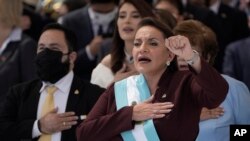The government of Honduras announced on Saturday that it will suspend some constitutional rights in areas of two main cities controlled by criminal groups.
The rights would be suspended under a national security emergency that would last for 30 days and be implemented on Tuesday in some of the poorest areas of the capital, Tegucigalpa, and the northern city of San Pedro Sula.
"The partial state of exception will enter into force on Tuesday, December 6 at 6 p.m. for thirty days, to promote the gradual activity of economic development, investment, commerce and in public spaces," the country's security secretariat said in a statement.
The cities have been struggling with a so-called "war tax," in which gangs offer protection or say that those who pay up will not be killed. The gangs have torched buses and killed drivers who did not pay the fee, prompting businesses and people to pay out of fear.
The measure, which is expected to be endorsed by the council of ministers, is part of President Xiomara Castro's plan to deal with violent gangs.
The plan follows pressure from businessmen, truck, bus and taxi drivers, residents and non-governmental organizations who say extortion, largely by the Mara Salvatrucha MS-13 and Mara Barrio 18 gangs, has worsened in recent months.
This extortion generates annual profits equivalent to $737 million for the gangs, nearly 3% of the country's gross domestic product, according to the Association for a More Just Society, a security-focused non-governmental organization.





